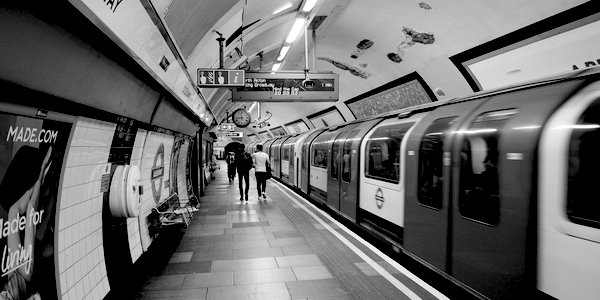A RECENT journey into London was heartbreaking. As my train pulled into Stratford station I felt decidedly uneasy, surrounded by unfamiliarity and strangeness. I grew up in London during the 1980s, so have always felt comfortable living in a multi-ethnic urban centre, but this was different. The multiplicity of languages being spoken and the sartorial mix on display rendered me a foreigner in my own capital city. My wife and I appeared to be the only ones speaking English.
As uncomfortable as it may be in the current climate, this is something we need to talk about. Many of the white British inhabitants of London have been forced out, disoriented victims of uncontrolled immigration and the refusal of politicians to demand the integration of our newcomers. Why on earth would a white Briton of Christian heritage wish to live in an area dominated by the intrusive call-to-prayer five times a day?
Discombobulated Londoners have fled to the shires, and who can blame them? Their city has been turned into a mosaic of third world countries, many of them backward, intolerant, war-torn and ravaged by religious and ethnic divisions. According to the 2021 census, the white British population of London has fallen to 37 per cent of the total, from 44 per cent in 2016 and almost 60 per cent in 2001.
Alongside this trend, the cockney accent is facing extinction, replaced by the Jamaican – or Jafakan – patois popularised by imported Yardie culture expressed through grime music and TV dramas like Top Boy. A recent study by linguists Amanda Cole and Patrycja Strycharczuk found that cockney is indeed being supplanted by multicultural London English (MLE) – Jafakan, in layman’s terms.
When (as they have done in the past) Europeans intrude upon the land of an indigenous tribe and force them to flee, we rightly accuse said Europeans of colonialism and ethnic cleansing. But when it comes to white British Londoners – who did not ask for unprecedented levels of migration to encroach upon their way of life – no one seems to care. The Pearly Kings and Queens don’t count. If they complain, they’re accused of every ism in the dictionary and intimidated into silence.
London isn’t the only city in the UK being cleansed of its indigenous population: Birmingham and Manchester are too. The 2021 census reveals that white Brits make up only 43 per cent of the total population of Birmingham (down from 52 per cent in 2016), and 49 per cent of Manchester (down from 58 per cent in 2016). It really is arresting stuff.
Indifference – even outright hostility – towards the white indigenous population is reflected by London’s divisive mayor. Last year Sadiq Khan’s official website published a photograph of a young white family with the caption: ‘Doesn’t represent real Londoners’. A recent Transport for London job advertisement, moreover, approved by its chair Mr Khan, specified that applicants would not be considered unless they came from ethnic minority backgrounds.
To add insult to injury, he’s permitted the adornment of London’s underground system with race-baiting bile disguised as a celebration of poetry. Through ‘the London Tube system’s long-running “Poems on the Underground” initiative’, and ostensibly in commemoration of the 75th anniversary of the arrival of the Empire Windrush, the poem Colonization in Reverse by Louise Bennett was, at public expense, published on trains throughout the capital. Written in Jamaican patois in 1966, it celebrates the ‘joyful news’ that ‘Jamaica people colonizin/Englan in reverse’.
This can only be interpreted as anti-white race-baiting, gloating over the de facto expulsion of many of London’s former white-British residents. Even Khan’s decision to expand the Ultra Low Emission Zone should be seen through the prism of his shameless racism. Car ownership is significantly higher among white British Londoners, especially those who live in the suburbs, so white Brits are of course disproportionately affected by the increased charges.
Some might argue, as Louise Bennett’s verse implies, that it’s payback: Britain colonised the world and now we – its people – must face the consequences: ‘reverse’ colonisation. This is a damaging narrative. First, it wrongly assumes that white Brits, in particular the working class who are most affected by such discrimination, benefited from imperial conquest. They didn’t. In fact, in places such as London, Birmingham and Manchester, they were just as downtrodden and abused as the chattel slaves of Jamaica. Secondly, it’s a vindictive approach that ignores the historic reality that all ethnic groups, at one time or another, have acted as both coloniser and colonised. Finally, and most importantly, it breeds resentment and lays the foundations for future conflict.
However, notwithstanding a few notable exceptions, our politicians can’t see – or don’t want to see – what’s going on. Despite minorities being significantly over-represented at the BBC, we’ve had one of its Asian employees, the absurd Nihal Arthanayake, decry the corporation’s excessive whiteness. Apparently, it’s detrimental to his fragile mental health. The BBC, in a characteristically craven response, apologised and promised to recruit more ethnic minorities – in other words, ‘positively’ discriminate against the country’s white majority.
On last week’s Triggernometry podcast, ex-BBC journalist Andrew Gold described how the corporation openly rejected his pitch to make a documentary because he was too white. Anti-white racism is strikingly, unashamedly, openly prevalent.

